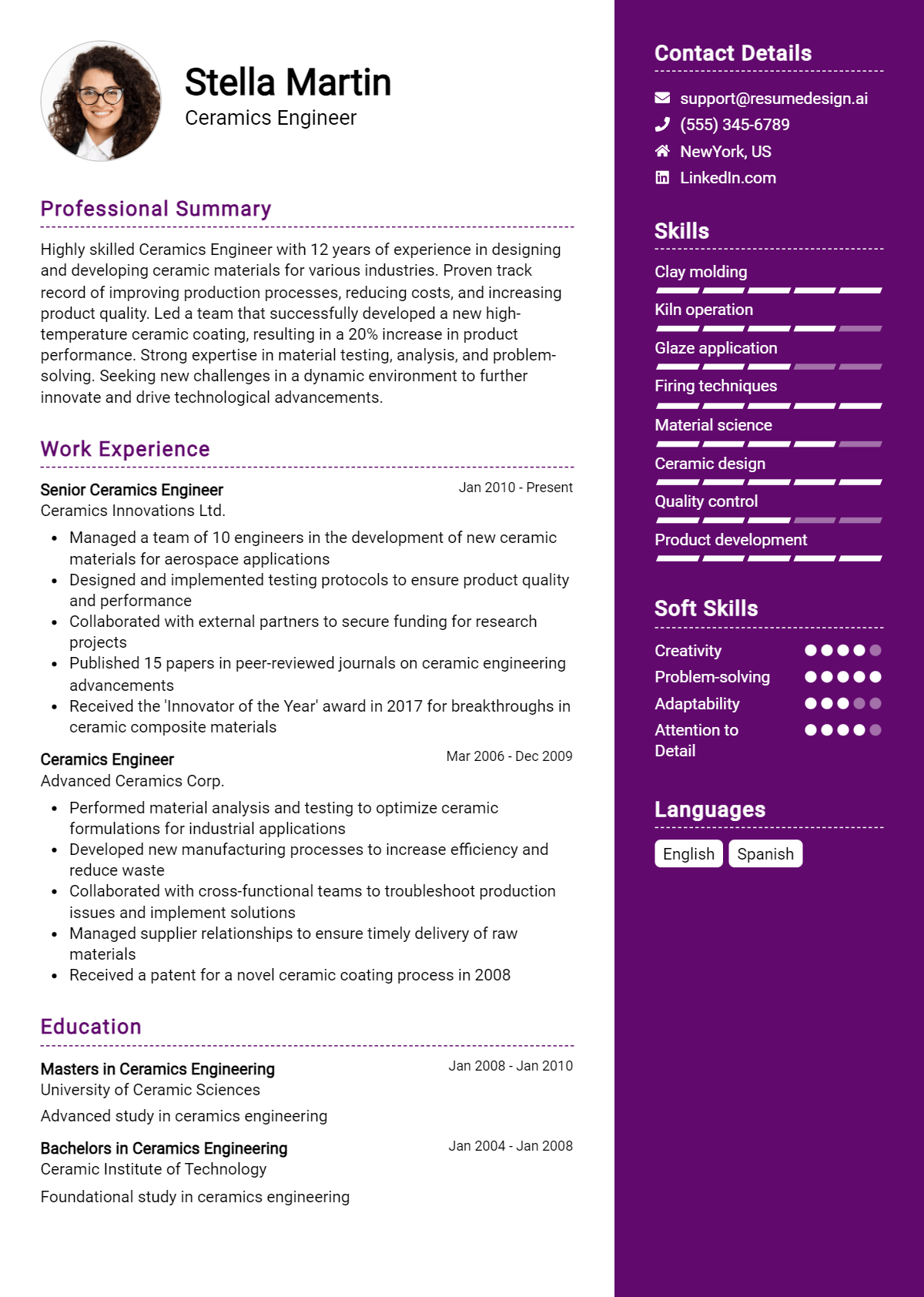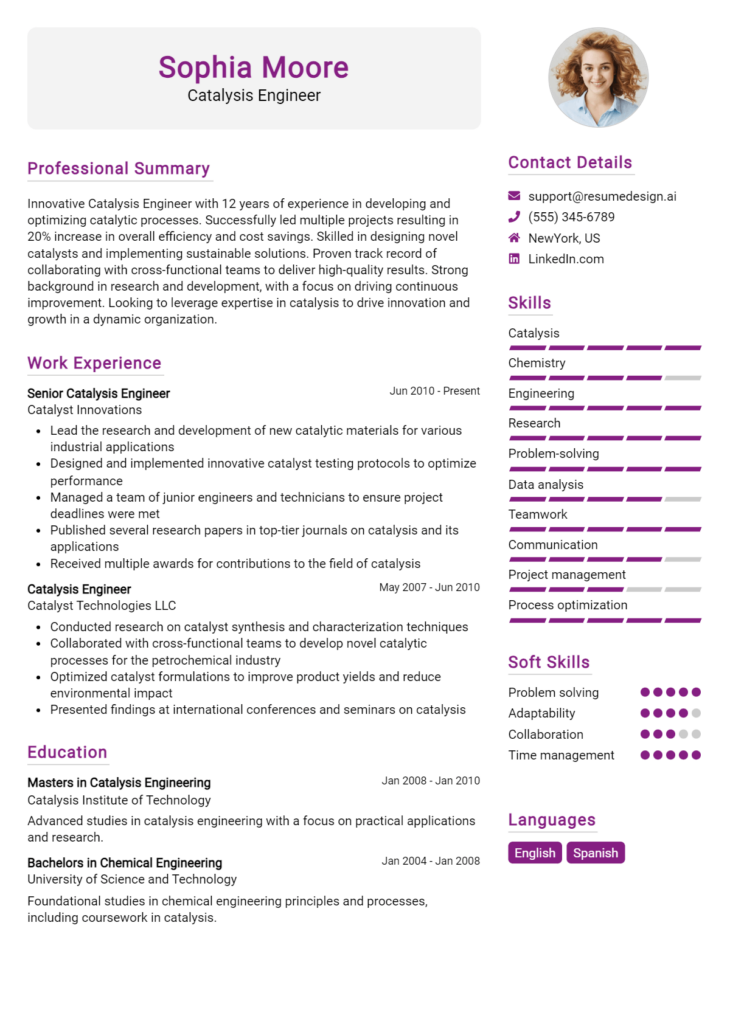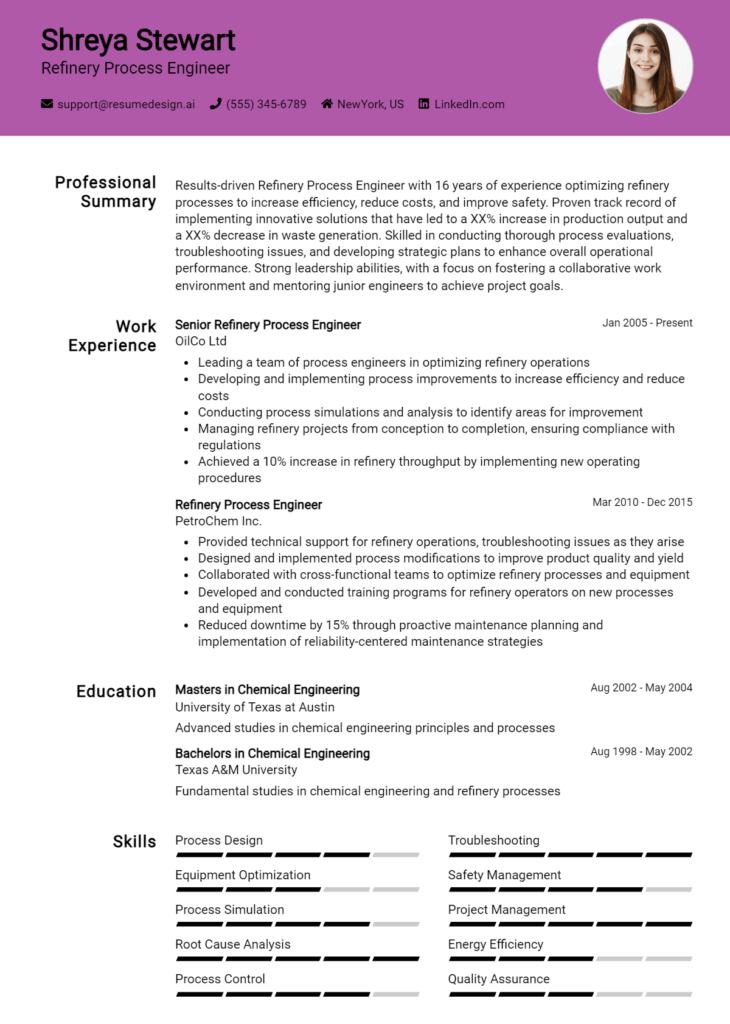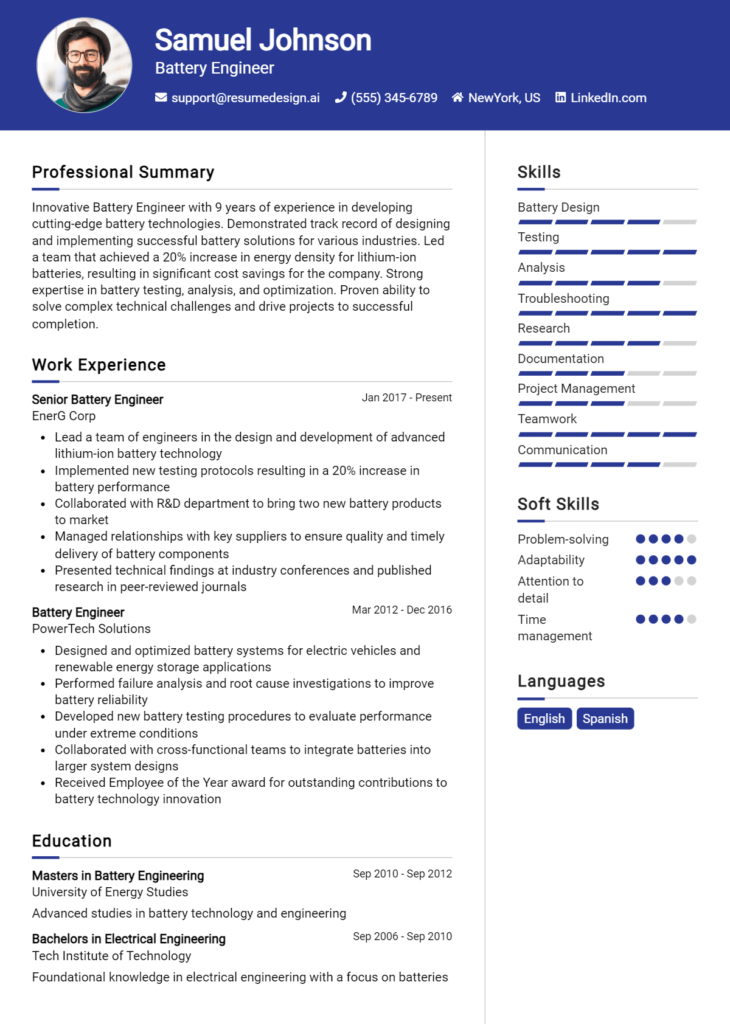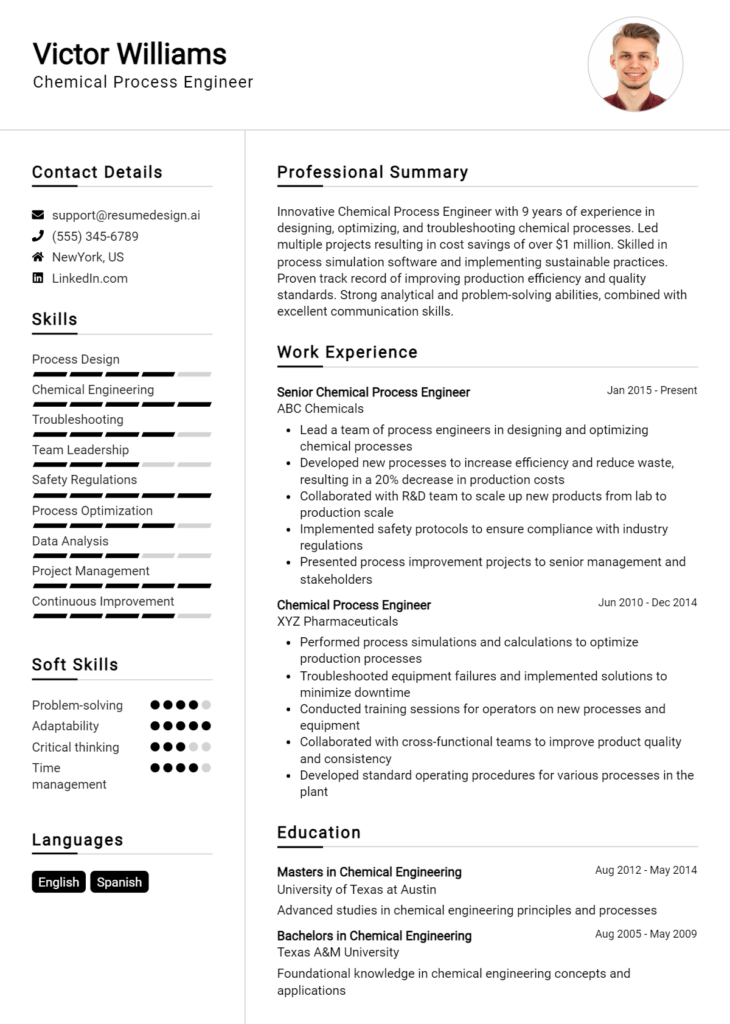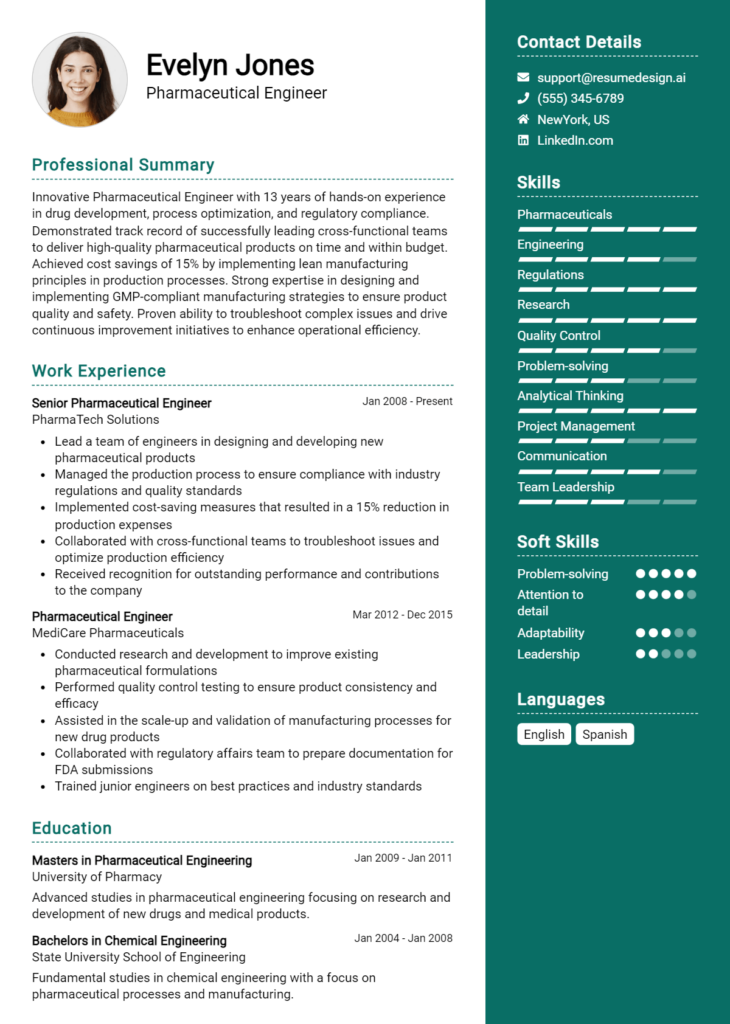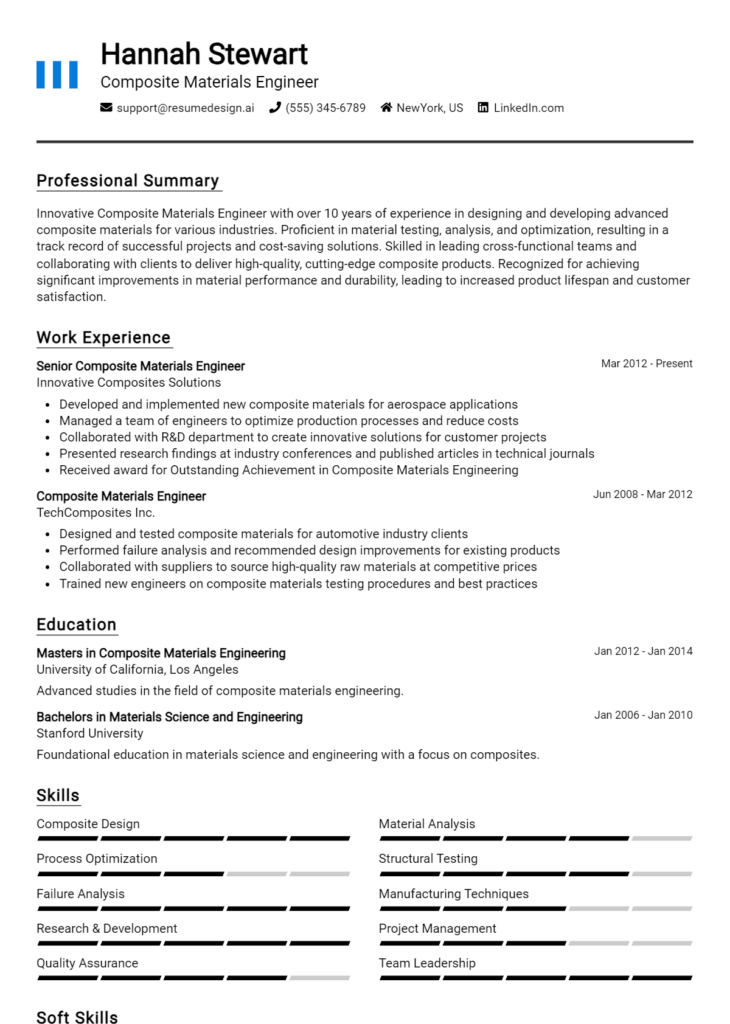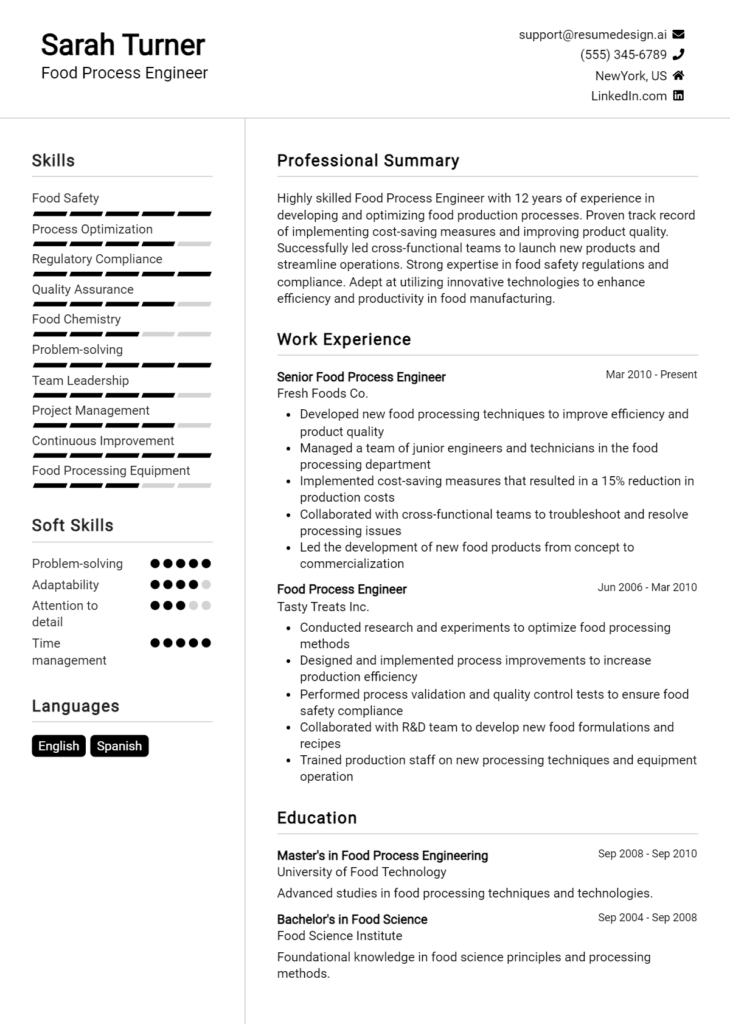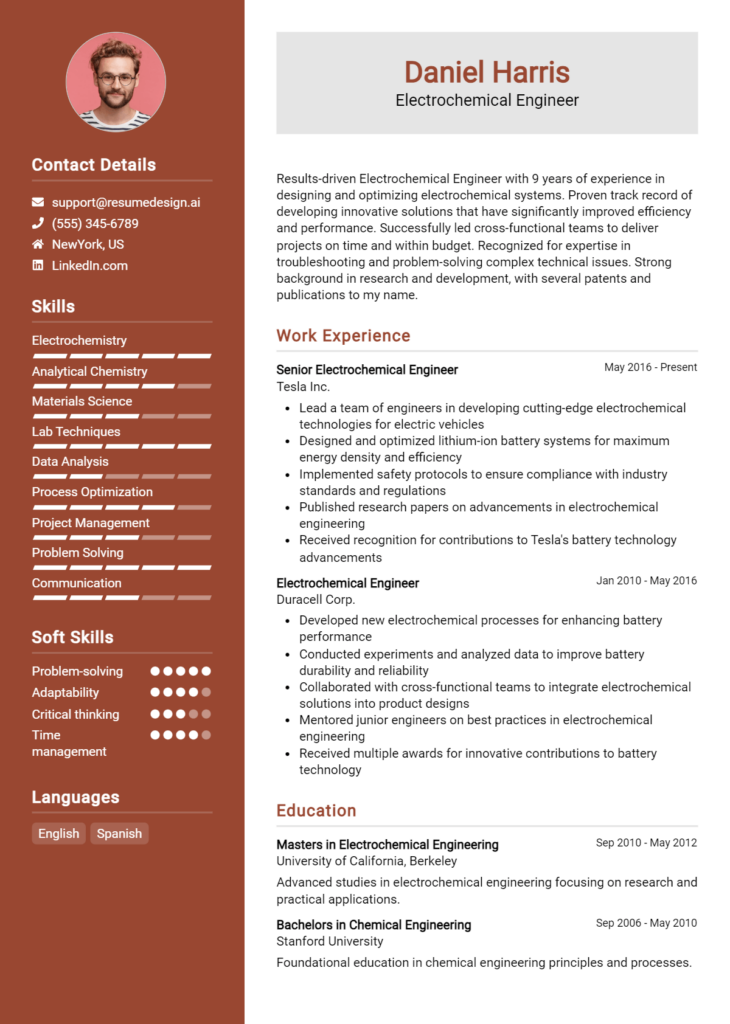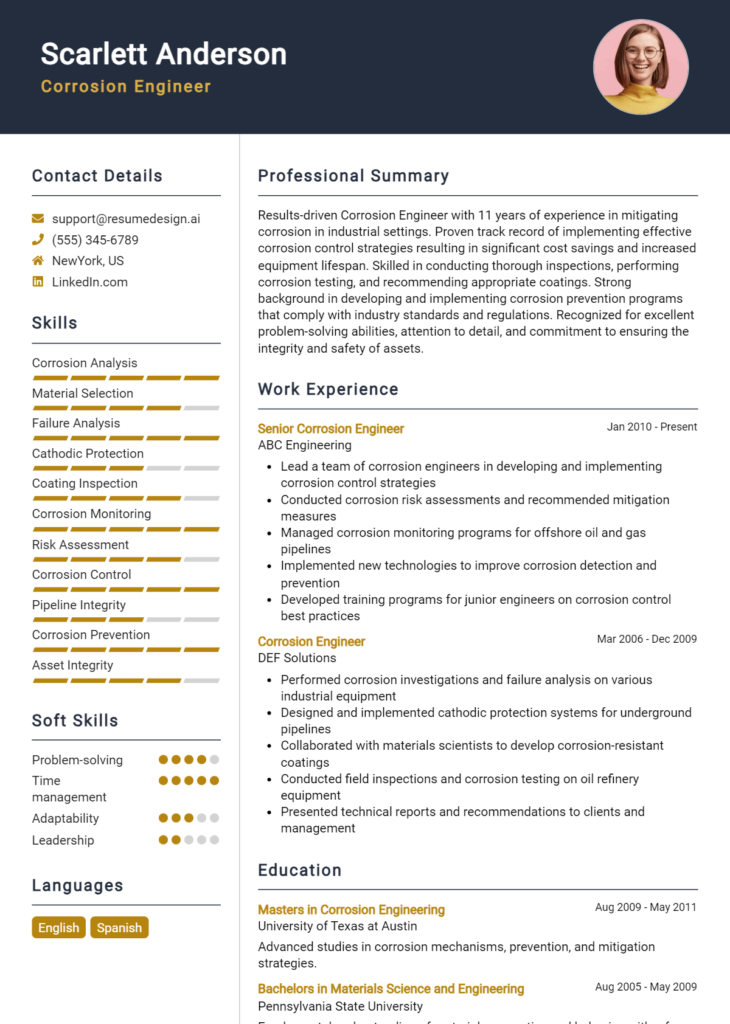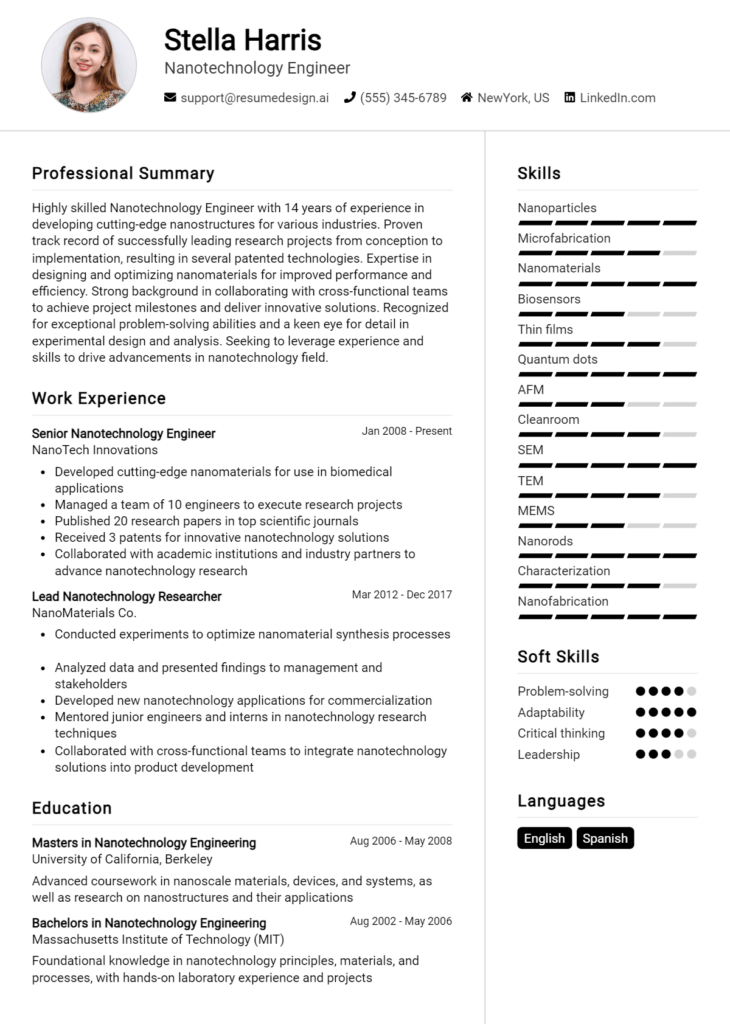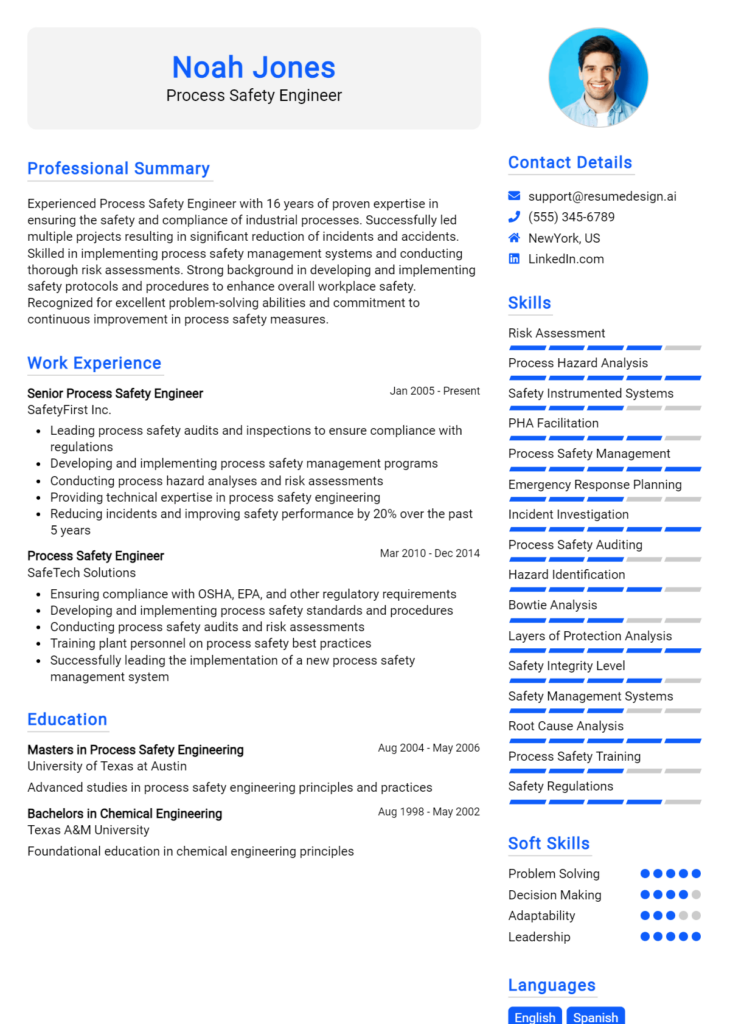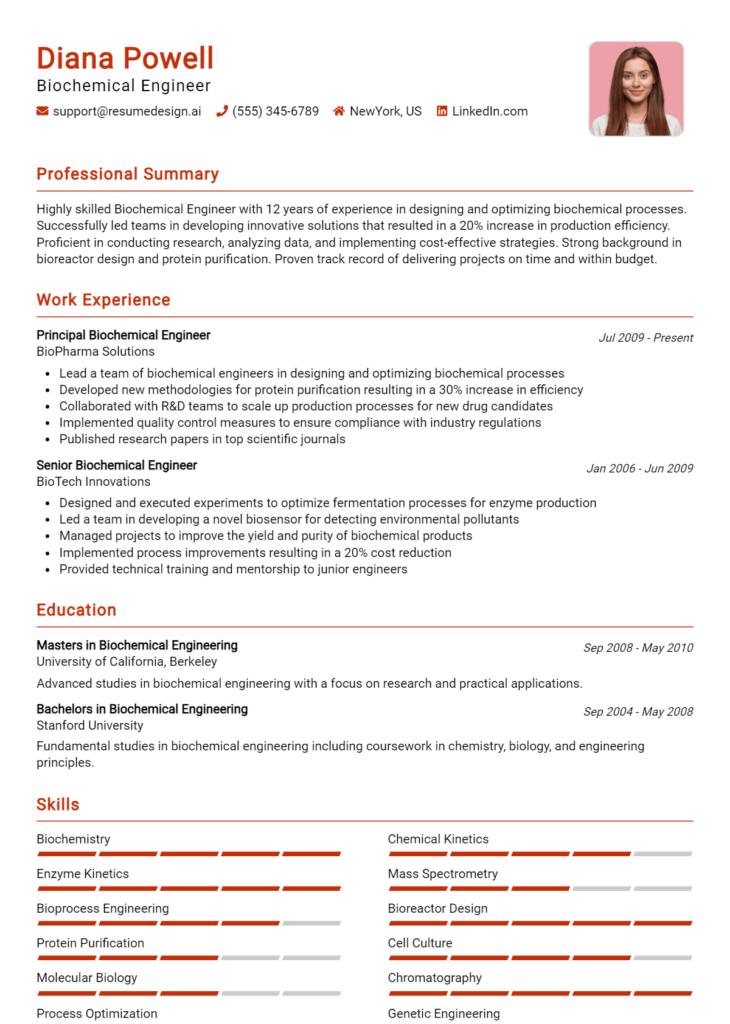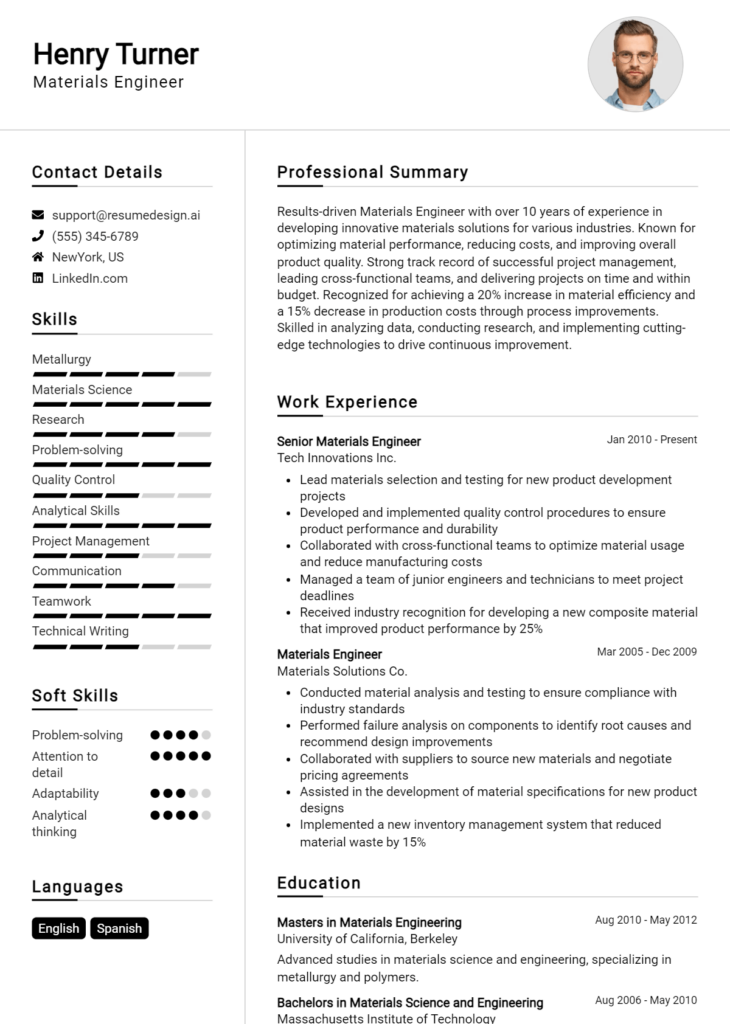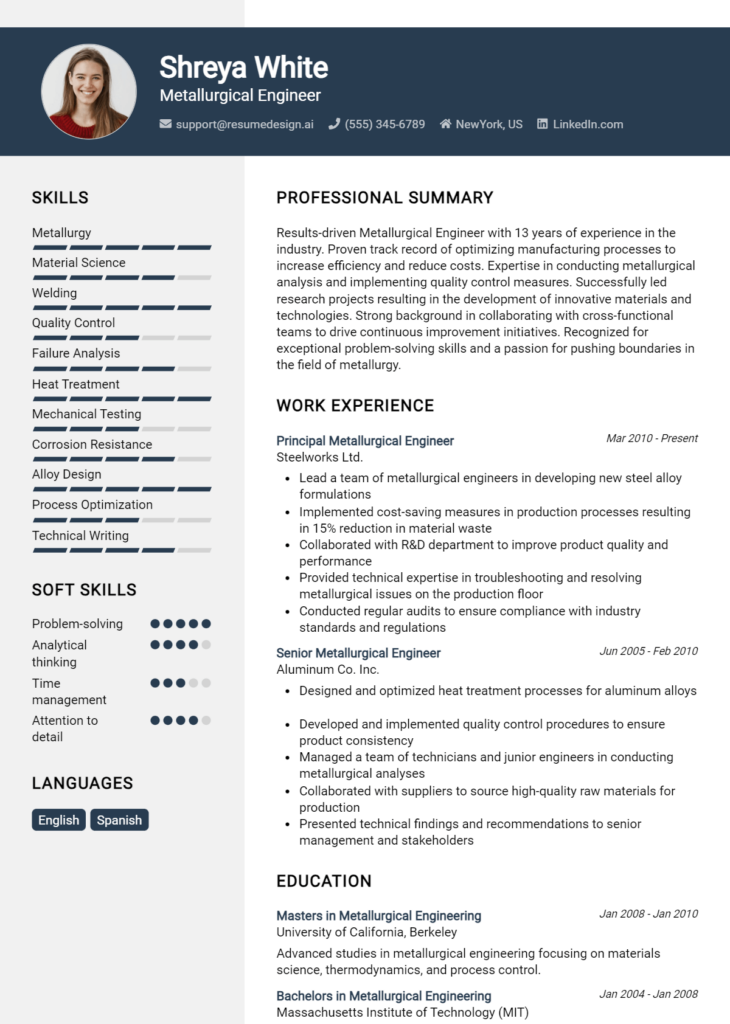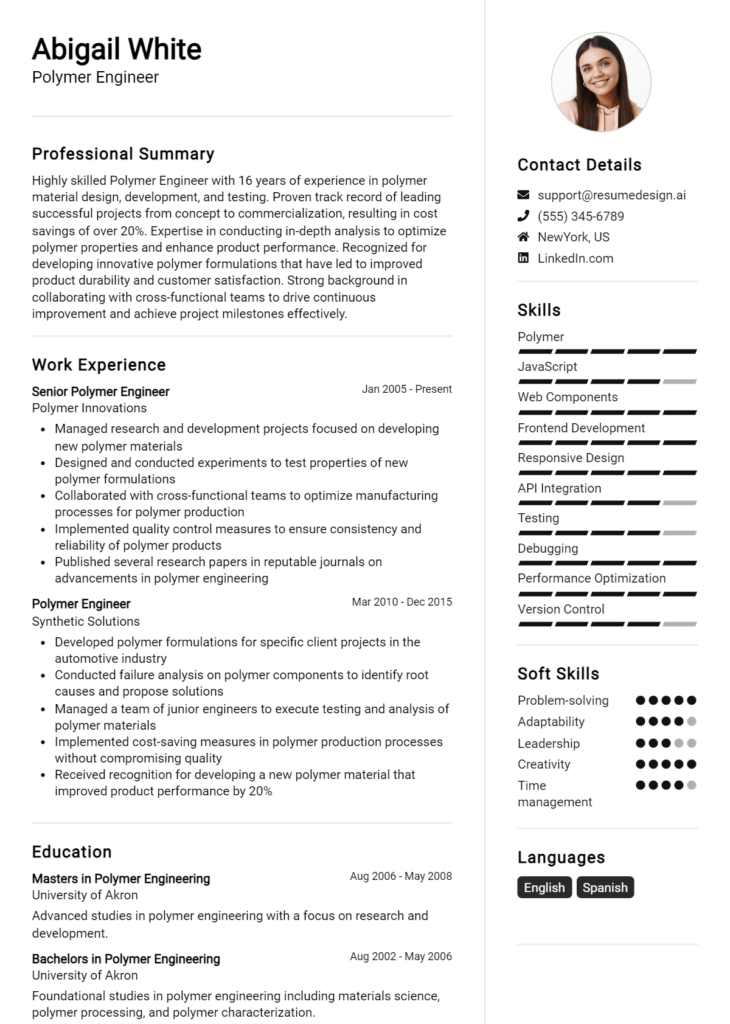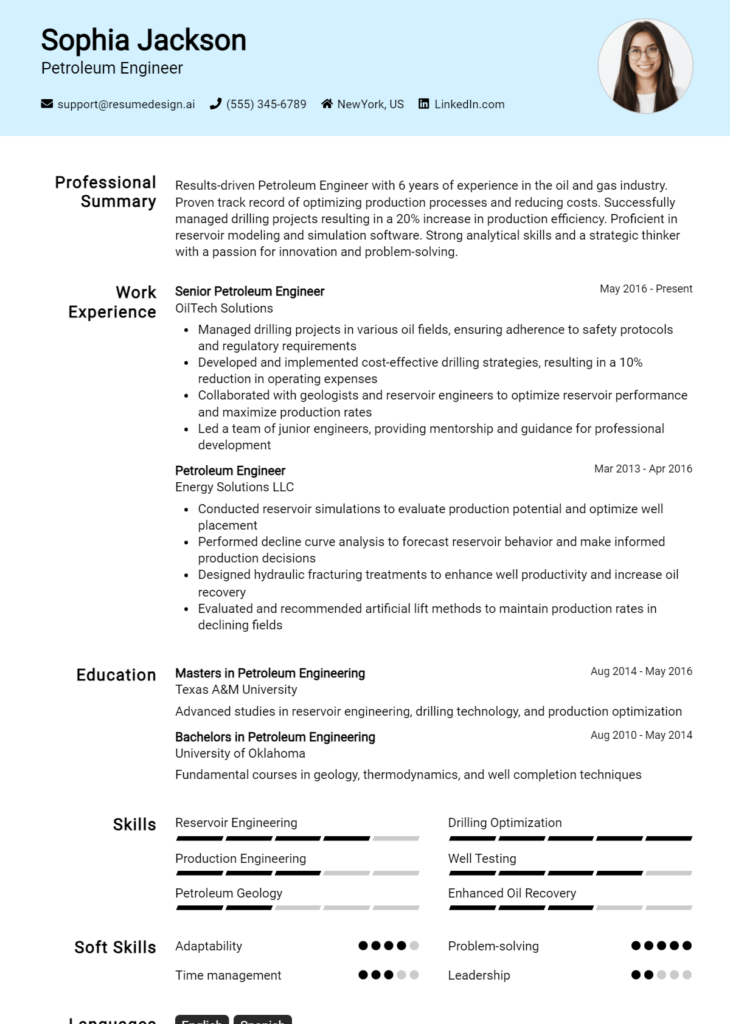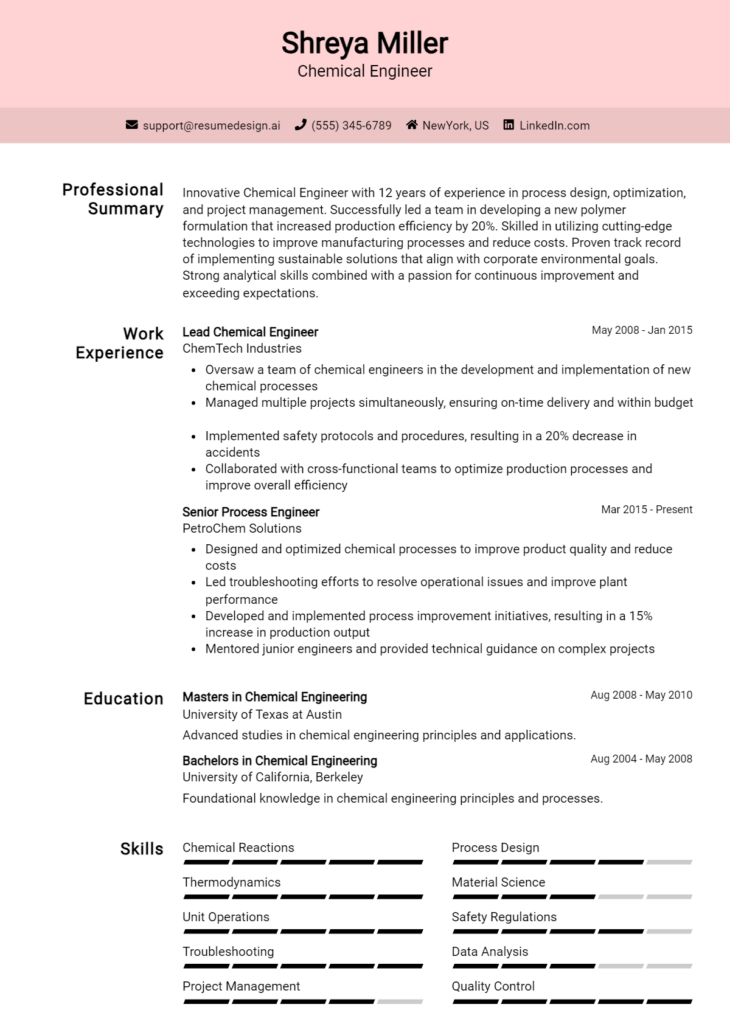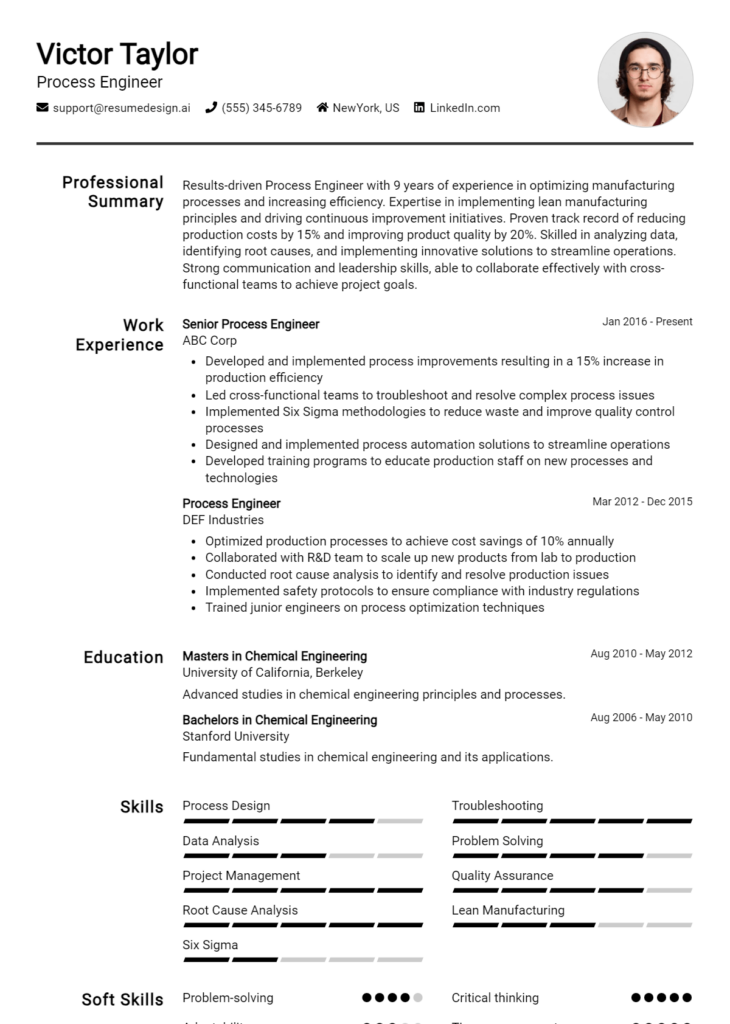Ceramics Engineer Core Responsibilities
A Ceramics Engineer plays a crucial role in the design, development, and production of ceramic materials, bridging the gap between various departments such as R&D, manufacturing, and quality control. Key responsibilities include material selection, process optimization, and troubleshooting production issues. Essential skills encompass technical expertise in ceramics science, operational efficiency, and strong problem-solving abilities. These competencies are vital for achieving organizational goals, and a well-structured resume showcasing these qualifications can significantly enhance job prospects.
Common Responsibilities Listed on Ceramics Engineer Resume
- Design and develop ceramic materials for various applications.
- Conduct experiments to analyze material properties and performance.
- Collaborate with cross-functional teams on product development.
- Optimize manufacturing processes to improve efficiency and quality.
- Ensure compliance with industry standards and regulations.
- Perform failure analysis and implement corrective actions.
- Utilize CAD software for design and modeling of ceramic components.
- Prepare technical documentation and reports for stakeholders.
- Train and supervise junior engineers and technicians.
- Monitor and evaluate production processes to ensure quality control.
- Stay updated with advancements in ceramics technology and materials.
- Participate in project management and budgeting activities.
High-Level Resume Tips for Ceramics Engineer Professionals
A well-crafted resume is essential for Ceramics Engineer professionals as it often serves as the first impression a candidate makes on potential employers. In a competitive job market, it's crucial for your resume to not only showcase your skills and achievements but also to align with the specific requirements of the positions you are targeting. A strong resume reflects your technical expertise, innovative problem-solving abilities, and your contributions to previous projects. This guide will provide practical and actionable resume tips specifically tailored for Ceramics Engineer professionals, ensuring that your application stands out in a sea of candidates.
Top Resume Tips for Ceramics Engineer Professionals
- Tailor your resume to each job description by incorporating keywords and phrases that align with the specific requirements of the position.
- Highlight relevant experience in ceramics engineering, including internships, projects, and job roles that demonstrate your expertise in materials science.
- Quantify your achievements by including metrics such as percentage improvements, cost savings, or production efficiencies to illustrate your impact.
- Showcase industry-specific skills, such as proficiency in CAD software, materials testing techniques, and knowledge of manufacturing processes.
- Include certifications and professional affiliations related to ceramics engineering to enhance your credibility and expertise.
- Utilize a clean and professional format that enhances readability, making it easy for hiring managers to quickly identify key information.
- Incorporate a summary statement at the top of your resume that encapsulates your career goals and key qualifications relevant to ceramics engineering.
- Keep your resume concise, ideally one page for entry to mid-level positions, while ensuring it still conveys all necessary information effectively.
- Use action verbs to describe your responsibilities and accomplishments, demonstrating your proactive approach and leadership in projects.
By implementing these tips, you can significantly increase your chances of landing a job in the Ceramics Engineer field. A well-structured and tailored resume not only highlights your qualifications but also communicates your passion for the industry, ultimately making a compelling case to potential employers.
Why Resume Headlines & Titles are Important for Ceramics Engineer
In the competitive field of ceramics engineering, a well-crafted resume headline or title serves as a critical first impression for hiring managers. A strong headline can immediately capture attention and succinctly summarize a candidate’s key qualifications and strengths in one impactful phrase. It should be concise, relevant, and directly related to the specific job being applied for, ensuring that it aligns with the expectations of the employer. By effectively showcasing expertise and specialization, a compelling resume headline sets the tone for the rest of the resume, encouraging hiring managers to delve deeper into the candidate's qualifications.
Best Practices for Crafting Resume Headlines for Ceramics Engineer
- Keep it concise: Aim for one impactful phrase that summarizes your qualifications.
- Be role-specific: Tailor your headline to reflect the specific position you are applying for.
- Highlight key skills: Incorporate your most relevant skills or certifications.
- Use action words: Start with strong verbs to convey confidence and capability.
- Incorporate metrics: If possible, include quantifiable achievements to demonstrate impact.
- Stay relevant: Ensure the headline aligns with industry trends and employer needs.
- Avoid jargon: Use clear, straightforward language that can be easily understood.
- Be unique: Differentiate yourself from other candidates by showcasing what sets you apart.
Example Resume Headlines for Ceramics Engineer
Strong Resume Headlines
Innovative Ceramics Engineer Specializing in Sustainable Material Development
Results-Driven Ceramics Engineer with 5+ Years of Experience in Product Design
Ceramics Engineer & Research Scientist Focused on Advanced Manufacturing Techniques
Weak Resume Headlines
Ceramics Engineer Seeking Job
Experienced Engineer
The strong headlines are effective because they convey specific expertise and accomplishments while immediately aligning with the needs of potential employers. They are tailored to the role, showcasing the candidate's unique strengths, which makes them more memorable. In contrast, the weak headlines fail to impress because they lack specificity and do not communicate any distinct value. Generic phrases do not capture the hiring manager’s interest or provide insight into the candidate’s qualifications, making them less likely to stand out in a pile of resumes.
Writing an Exceptional Ceramics Engineer Resume Summary
A resume summary is a crucial component of a Ceramics Engineer's job application, serving as a first impression for potential employers. This concise overview quickly captures the attention of hiring managers by highlighting key skills, relevant experience, and tangible accomplishments that align with the job description. A strong summary not only sets the tone for the rest of the resume but also provides a snapshot of the candidate's qualifications, making it easier for hiring managers to identify top talent in a competitive field. Therefore, crafting an impactful and tailored resume summary is essential for standing out in the job market.
Best Practices for Writing a Ceramics Engineer Resume Summary
- Quantify achievements: Use numbers to demonstrate the impact of your work, such as percentage improvements or cost savings.
- Focus on relevant skills: Highlight specific technical skills that are pertinent to ceramics engineering, such as materials science, CAD software, or kiln operation.
- Tailor the summary: Customize your resume summary for each job application to align with the specific requirements and keywords in the job description.
- Keep it concise: Aim for 3-5 sentences that deliver maximum impact without overwhelming the reader.
- Use action verbs: Start sentences with strong action verbs to convey confidence and proactivity.
- Showcase soft skills: Include essential soft skills such as problem-solving, teamwork, and communication that are valuable in engineering roles.
- Highlight industry experience: Mention any relevant experience within the ceramics industry or related fields to establish credibility.
- Include certifications: If applicable, mention any relevant certifications or specialized training that enhance your qualifications.
Example Ceramics Engineer Resume Summaries
Strong Resume Summaries
Dynamic Ceramics Engineer with over 7 years of experience in developing advanced ceramic materials for aerospace applications, resulting in a 30% increase in product durability. Proficient in CAD design and ceramic processing techniques, with a strong focus on quality control and process optimization.
Results-driven Ceramics Engineer skilled in the formulation and testing of ceramic composites. Successfully led a project that reduced production costs by 15% while improving product performance by 20%, utilizing innovative manufacturing processes and materials testing methodologies.
Detail-oriented Ceramics Engineer with a proven track record of enhancing product designs through 3D modeling and simulation. Achieved a 25% reduction in material waste during production by implementing lean manufacturing principles and continuous improvement strategies.
Weak Resume Summaries
Experienced engineer looking for a job in ceramics. I have some skills in materials science and have worked on various projects.
Ceramics Engineer with a good background in the field. I am dedicated and ready to contribute to a team.
The strong resume summaries are considered effective because they are specific, quantify achievements, and demonstrate a clear alignment with the requirements of the ceramics engineering role. They showcase relevant skills and concrete outcomes that illustrate the candidate's value. In contrast, the weak resume summaries are vague and lack measurable results, making it difficult for hiring managers to gauge the candidate's qualifications or potential contributions. These summaries do not effectively capture the unique strengths or experiences that could set the candidate apart in a competitive job market.
Work Experience Section for Ceramics Engineer Resume
The work experience section of a Ceramics Engineer resume is a critical component that highlights the candidate's technical abilities, leadership skills, and commitment to delivering high-quality ceramic products. This section not only showcases relevant work history but also emphasizes the candidate's capacity to manage teams effectively and their proficiency in utilizing advanced materials and processes. By quantifying achievements and aligning experiences with industry standards, candidates can demonstrate their value to potential employers and their readiness to contribute to innovative projects in the ceramics field.
Best Practices for Ceramics Engineer Work Experience
- Clearly specify job titles and dates of employment to provide a chronological overview.
- Use action verbs to describe responsibilities and achievements, emphasizing technical skills.
- Quantify results where possible, such as percentage improvements, cost savings, or production increases.
- Highlight collaboration with cross-functional teams to showcase teamwork and communication skills.
- Include relevant industry certifications or training that support your technical expertise.
- Focus on specific projects that demonstrate innovative solutions and problem-solving abilities.
- Tailor your experiences to match the job description of the position you are applying for.
- Use bullet points for clarity and to make your accomplishments easy to read and digest.
Example Work Experiences for Ceramics Engineer
Strong Experiences
- Led a cross-functional team in the development of a new ceramic composite, resulting in a 30% increase in tensile strength and a reduction in production costs by 15%.
- Implemented advanced testing protocols that enhanced product quality control, decreasing defect rates from 5% to 1% over a one-year period.
- Managed the transition to a more sustainable material sourcing process, reducing waste by 40% and improving environmental compliance.
- Collaborated with manufacturing teams to streamline the production process, achieving a 20% increase in output without sacrificing quality.
Weak Experiences
- Worked on various projects related to ceramics.
- Assisted in the production of ceramic products.
- Helped with testing and quality assurance.
- Participated in team meetings and discussions.
The examples categorized as strong demonstrate concrete achievements, specific technical contributions, and effective collaboration, making them compelling to potential employers. In contrast, the weak experiences lack detail, quantifiable outcomes, and distinct responsibilities, making them less impactful and failing to illustrate the candidate's true capabilities in the field of ceramics engineering.
Education and Certifications Section for Ceramics Engineer Resume
The education and certifications section of a Ceramics Engineer resume plays a crucial role in showcasing the candidate's academic background, industry-relevant qualifications, and commitment to ongoing professional development. This section not only reflects the foundational knowledge gained through formal education but also highlights specialized training and certifications that align with industry standards. By providing relevant coursework, certifications, and any specialized training, candidates can significantly enhance their credibility and demonstrate their alignment with the job role, making them more appealing to potential employers.
Best Practices for Ceramics Engineer Education and Certifications
- Include only relevant degrees and certifications that pertain to ceramics engineering.
- List your highest degree first, followed by additional degrees in reverse chronological order.
- Highlight industry-recognized certifications that showcase specialized skills and knowledge.
- Provide specific coursework or projects that relate directly to ceramics engineering.
- Use clear and concise language to describe your educational background and certifications.
- Consider including ongoing education or training to demonstrate commitment to continuous learning.
- Be sure to include the name of the institution, degree earned, and graduation year.
- Keep this section up-to-date to reflect your most current qualifications.
Example Education and Certifications for Ceramics Engineer
Strong Examples
- M.S. in Materials Science and Engineering, University of California, Berkeley, 2021
- Certified Ceramic Engineer (CCE), American Ceramic Society, 2022
- Relevant Coursework: Advanced Ceramics Processing, Materials Characterization Techniques, and Ceramic Composite Materials.
- Professional Development: Completed a workshop on Additive Manufacturing in Ceramics, 2023.
Weak Examples
- B.A. in History, State University, 2010
- Certification in Basic Computer Skills, Online Course, 2019
- Relevant Coursework: Introduction to Literature and Creative Writing.
- Outdated Certification: Certified Welding Inspector (CWI), 2015.
The strong examples are considered effective because they are directly related to the field of ceramics engineering, showcasing advanced degrees and certifications that enhance the candidate's qualifications. In contrast, the weak examples illustrate educational qualifications that are unrelated to ceramics engineering, demonstrating a lack of focus and relevance to the job role. This distinction is critical for employers seeking candidates who are well-prepared for the demands of the position.
Top Skills & Keywords for Ceramics Engineer Resume
In the competitive field of ceramics engineering, having a well-crafted resume that highlights your skills is essential for standing out to potential employers. Skills serve as a testament to your expertise and can make or break your chances of landing an interview. A blend of both soft and hard skills is crucial in this role, as it reflects your technical capabilities and your ability to collaborate, solve problems, and communicate effectively in a team environment. Demonstrating a comprehensive skill set not only showcases your qualifications but also signals your readiness to tackle the challenges presented in the ceramics industry.
Top Hard & Soft Skills for Ceramics Engineer
Soft Skills
- Analytical thinking
- Problem-solving
- Attention to detail
- Team collaboration
- Communication skills
- Time management
- Creativity
- Adaptability
- Conflict resolution
- Project management
Hard Skills
- Knowledge of ceramic materials and processes
- Proficiency in CAD software
- Familiarity with materials characterization techniques
- Understanding of thermal and mechanical properties of ceramics
- Experience with process optimization
- Quality control and testing methods
- Ability to conduct failure analysis
- Knowledge of kiln operation and firing processes
- Familiarity with manufacturing standards
- Proficient in data analysis and simulation software
By incorporating these skills into your resume and highlighting relevant work experience, you can create a compelling narrative of your professional capabilities that resonates with hiring managers.
Stand Out with a Winning Ceramics Engineer Cover Letter
I am writing to express my enthusiasm for the Ceramics Engineer position at [Company Name], as advertised on [Job Board/Website]. With a Master’s degree in Materials Science and over five years of hands-on experience in ceramics development and processing, I possess a robust understanding of both the theoretical and practical aspects of ceramic materials. My background includes working with various ceramic compositions, optimizing manufacturing processes, and conducting rigorous quality assurance testing to ensure product excellence.
During my tenure at [Previous Company Name], I successfully led a project that involved the development of a new high-performance ceramic material designed for use in aerospace applications. By collaborating closely with cross-functional teams, I was able to reduce production costs by 20% while enhancing the material's thermal stability and mechanical strength. This experience honed my project management skills and deepened my passion for innovation in ceramics, making me an ideal fit for your team at [Company Name].
I am particularly drawn to [Company Name] because of its commitment to sustainability and cutting-edge research in advanced ceramics. I am eager to contribute my expertise in developing environmentally friendly ceramic materials and processes that align with your mission. My proficiency with CAD software and simulation tools, combined with my strong analytical skills, will enable me to effectively contribute to your projects from conception through to final production.
Thank you for considering my application. I am excited about the possibility of joining [Company Name] and contributing to your groundbreaking work in ceramics. I look forward to discussing how my background, skills, and enthusiasms align with the goals of your team. Please feel free to contact me at [Your Phone Number] or [Your Email Address] to arrange a conversation.
Common Mistakes to Avoid in a Ceramics Engineer Resume
When crafting a resume for a Ceramics Engineer position, it's essential to showcase your technical skills and relevant experience effectively. However, many candidates fall into common pitfalls that can undermine their application. Avoiding these mistakes can significantly improve your chances of landing an interview by presenting a clear, professional, and impactful resume that highlights your qualifications. Here are some common mistakes to steer clear of:
Generic Objective Statement: Using a vague objective statement that doesn't specifically relate to ceramics engineering can make your resume less compelling. Tailor your objective to reflect your career goals and how they align with the position.
Neglecting Keywords: Failing to include industry-specific keywords can hinder your resume's visibility in applicant tracking systems (ATS). Incorporate relevant terms like "ceramic materials," "thermal properties," or "sintering processes."
Overloading with Technical Jargon: While technical expertise is crucial, overloading your resume with excessive jargon can alienate hiring managers who may not be familiar with all terms. Aim for clarity and balance between technical language and understandable descriptions.
Ignoring Soft Skills: Focusing solely on technical skills and neglecting soft skills such as teamwork, communication, and problem-solving can limit your appeal. Highlighting your ability to collaborate effectively can set you apart from other candidates.
Lack of Quantifiable Achievements: Simply listing job duties without quantifying accomplishments can make your contributions appear less impactful. Use numbers and metrics to showcase your achievements, such as "increased production efficiency by 20%."
Inconsistent Formatting: A poorly formatted resume can detract from your professionalism. Ensure consistent font styles, sizes, and headings throughout the document to create a polished and organized appearance.
Excessive Length: Submitting a lengthy resume filled with irrelevant information can overwhelm hiring managers. Aim for a concise, one-page resume that highlights your most relevant experiences and skills.
Failing to Customize for Each Application: Using the same resume for multiple applications can lead to missed opportunities. Tailor your resume for each position by emphasizing the skills and experiences that are most relevant to the specific job description.
Conclusion
As a Ceramics Engineer, your expertise in materials science, design, and manufacturing processes plays a crucial role in various industries, from aerospace to electronics. In this article, we explored the essential skills required for success in this field, including an understanding of ceramic materials, strong problem-solving abilities, and experience with advanced manufacturing techniques. We also highlighted the importance of staying updated with industry trends and continuous learning through professional development.
To ensure that you effectively present your qualifications and experiences, it's vital to have a well-crafted resume that stands out. Take this opportunity to review your Ceramics Engineer resume and make any necessary updates to reflect your skills and achievements accurately.
Utilize available resources to enhance your resume and application materials. Consider using resume templates to guide your formatting and layout. The resume builder can streamline the process of creating a professional document tailored to your experiences. For inspiration, check out various resume examples that showcase effective presentations of qualifications. Additionally, don't forget to craft a compelling cover letter with the help of cover letter templates to complement your resume.
Take action today: revisit your resume, implement these tools, and position yourself for success in your career as a Ceramics Engineer!

